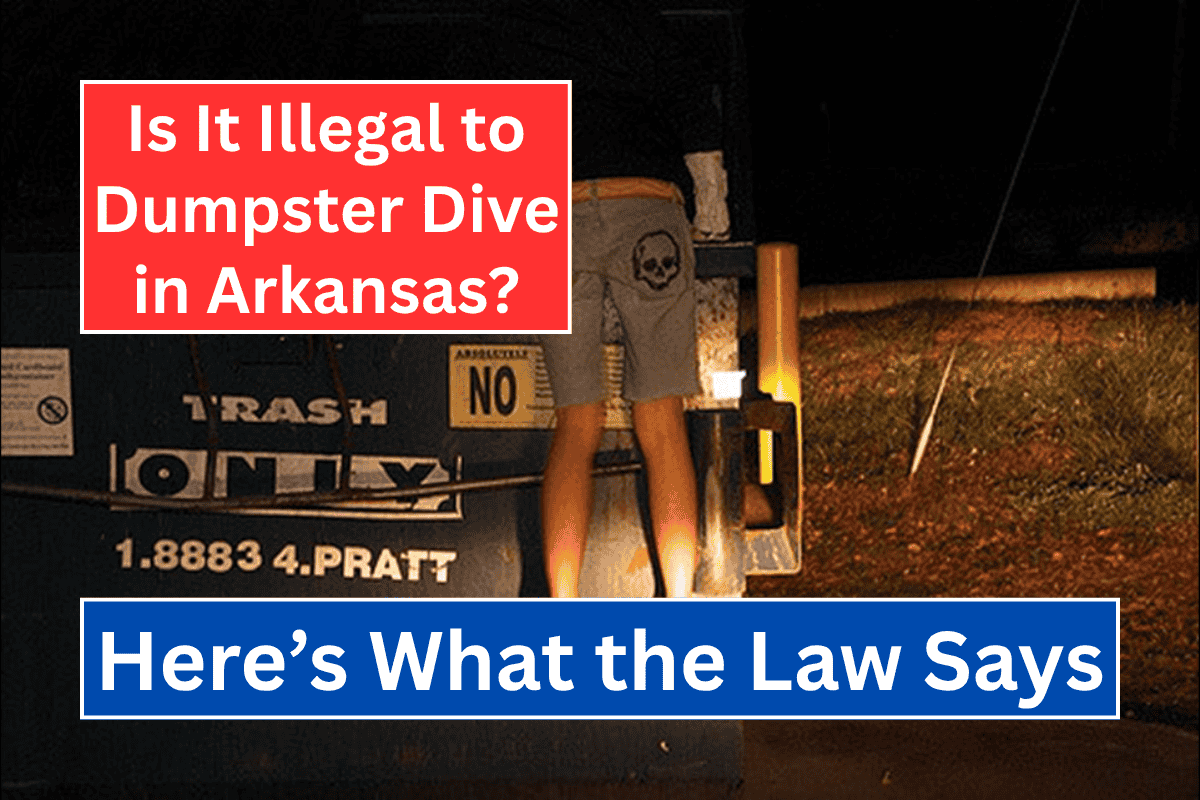Dumpster diving might seem harmless—you’re simply recycling and repurposing items that others have discarded. However, it’s important to know the law before you dive into someone else’s trash.
In Arkansas, as in other states, dumpster diving is generally legal with certain conditions, but there are nuances that can land you in legal trouble if you’re not careful.
Let’s break down the key points of the law and what you need to know to avoid any unwanted run-ins with law enforcement.
Understanding the Legal Landscape for Dumpster Diving
Dumpster diving is legal in all 50 states, including Arkansas, but there are several factors that can determine whether or not you’re breaking the law.
In 1988, the U.S. Supreme Court ruled in State of California v. Greenwood that searching trash is legal as long as there are no local ordinances that prohibit it.
This means that while dumpster diving is legal from a federal standpoint, state, city, or even private property laws might impose restrictions.
Here’s a general breakdown of the rules:
- Federal Law: Dumpster diving is legal.
- State Law: Dumpster diving is generally legal unless state-specific laws say otherwise.
- County or City Law: This is where it gets tricky. Some localities may have ordinances that prohibit dumpster diving. You must research local laws to make sure you’re in compliance.
- Private Property: It’s illegal to dive in dumpsters located on private property without permission. If you’re caught on private land, you may be trespassing.
To avoid running into trouble, it’s important to check your local laws, as they can vary greatly even within the same state.
Key Laws That Affect Dumpster Diving in Arkansas
- Trespassing Laws:
If you enter private property to dive into a dumpster, this may count as trespassing, which is illegal. Many businesses and properties have restricted areas where their trash is disposed of, and entering these areas without permission can result in fines or even an arrest. In Arkansas, trespassing laws are taken seriously, and getting caught could mean serious consequences. - Private Property and Dumpster Signs:
Businesses often place signs on dumpsters to prohibit people from rummaging through them. If a dumpster has a sign that says “No Dumpster Diving,” it’s illegal to dive there. Additionally, tampering with locks or barriers that businesses have put in place to secure their trash is also illegal and can result in fines or arrest. - Disorderly Conduct:
Dumpster diving, especially in public spaces, can sometimes lead to complaints from nearby residents or business owners. If your activity is disturbing the peace or causing a mess, law enforcement may intervene. In some cases, what starts as a fun hobby can be classified as disorderly conduct if it creates a public nuisance. Always be respectful of your surroundings and avoid creating a mess that could prompt complaints. - Using a Vehicle for Dumpster Diving:
If you’re using a vehicle to park near a dumpster or fill it up with items you’ve retrieved, this can look suspicious to others. Passersby or business owners may believe you’re stealing, especially if you are removing high-value items like electronics, food, or recyclables. This could lead to calls to the police, who may question your intentions. - Recycling and Collecting Recyclable Items:
While some people dumpster dive for recyclables to turn in for money, this can be seen as theft. Many businesses have specific rules regarding recycling, and taking these items without permission might get you into trouble. Even if you’re just trying to be eco-friendly, it’s important to avoid diving for recyclables unless you have explicit permission.
When Dumpster Diving Becomes Illegal
While dumpster diving itself is not illegal, there are circumstances where it becomes a violation of the law:
- Trespassing: Entering a private property or business area without permission to access a dumpster.
- Tampering with Locks: Many businesses lock their dumpsters to prevent unauthorized access. Tampering with or breaking locks is illegal.
- Disorderly Conduct: If your dumpster diving activities create a public disturbance or mess, law enforcement can issue fines or ask you to leave.
- Theft: Taking items from a dumpster that are considered valuable or intended for recycling can be considered theft if it’s deemed as taking something that doesn’t belong to you.
Is It Worth the Risk?
Dumpster diving can be a great way to find items you need, from food to furniture or even electronics. However, it’s important to assess the risks before diving into someone else’s trash. You may find yourself facing fines, legal issues, or even injury if you’re not careful.
If you’re uncertain about whether or not it’s allowed in your area, you can always ask the business owner or local authorities for permission. Additionally, always be mindful of your safety while dumpster diving, especially in areas that are not well-lit or are in high-traffic zones.
Takeaways for Dumpster Diving in Arkansas
- Know Local Laws: Before dumpster diving, make sure you check local regulations, especially regarding public and private property.
- Don’t Trespass: Never dive into dumpsters located on private property unless you have explicit permission.
- Respect Signage: If a business has posted signs prohibiting dumpster diving, abide by them.
- Be Discreet and Safe: Avoid creating disturbances or leaving a mess, and be cautious about using your vehicle in the area to avoid suspicion.












